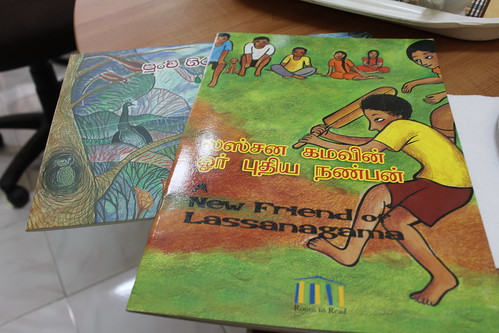Even now, all the narrow, traffic-choked roads leading out of Colombo are punctuated by security checkpoints, although these are now mostly formalities. A bored soldier carrying an enormous gun glances into our van and, spotting me, grins and says "Ni hao ma?" before waving us on. Chinese foreigners are never involved with the terrorists, I guess. As we drive off, I can't pull my camera out fast enough to snap a picture of the sign proclaiming that the checkpoint was sponsored by a bank.
Most residents of Colombo I talked to said that the war didn't affect them much in the city, that it was a saga unfolding on television whose ebbs and flows was echoed by how bad the security (and therefore the traffic) got. Like me, many of them don't know what life is like in the post-conflict regions because getting security clearance to go is too much of a hassle. In fact, Room to Read is one of very few international non-governmental organizations to earn the government's permission to continue work in the North.

Tamil and Sinhalese titles published by Room to Read
While the war-afflicted regions certainly have more pressing short-term needs, education is recognized as a crucial long-term development need in the area. During the last 3 decades of conflict, few teachers were willing (or able) to move to the region; as a result, districts like Mannar only have 10% of the teachers they need, and the numbers are still barely rising due to continued fears of conflict. As a short-term solution for the shortage, the government has temporarily converted some of the soldiers posted in the area, fresh off the battlefield and with no educational training, to elementary school math and English teachers. The government is looking into ways to ameliorate this, but becoming certified as a teacher is a costly and lengthy procedure that can only happen in Colombo, shutting out many interested candidates within the war-afflicted regions who do not have the funds to travel.
Perhaps the most important challenge that education must address, despite its limited and problematic resources, is that of racism itself. The war might be over, but the ethnic tensions that caused it in the first place have not dissipated. The distrust between the two populations is noticeable even outside the conflict regions, and many children grow up with strong misconceptions about the other ethnicity even when they go to school together. Changing the racial prejudice harbored by adults after a lengthy and bloody conflict will be difficult, but children still have the opportunity to learn tolerance from an early age.
This is where it seems like Room to Read could really make a big difference. Especially in the conflict regions, Room to Read's Local Language Publishing Program makes up a significant portion of the reading material available to children. Currently, Room to Read publishes both Sinhalese and Tamil titles to encourage literacy in children speaking either language, and books in both languages also include English translations as English has become the unofficial bridging language between the two. However, I would love to see Room to Read more proactively leverage this platform to promote cross-cultural understanding by encouraging titles that educate children about interracial friendships. In fact, perhaps this campaign could even go beyond the Sinhalese and the Tamil to include the other ethnic groups of Sri Lanka--the indigenous Vedda, the Muslim Moors, and the Dutch-descended Burghers. Cleaning up the aftermath of war is hard, but there's no better time to start fresh with a new generation so that it doesn't happen again.

ok…that didnt quite sound right. Im trying to say that these children who had previously grown with a lot of misunderstanding and misconception..met other children from across the divide, and began to understand them, just as they began to understand concepts like the ocean for example . its not something you can just tell someone unless they experiance it for themselves, you will agree. :-)
nice post Christina. Yes, I agree children dont know about the Others. we had a programme some time back for Inter Community camps, some of the children in the Estate sectors have not seen the sea and were told that the SInhala were savage like animals, the children in the south beleived that all Tamils were Tigers, after this camp they came away with new life long friends, it was very heartening. this from just a fun filled 3 day summer camp in a host school !!